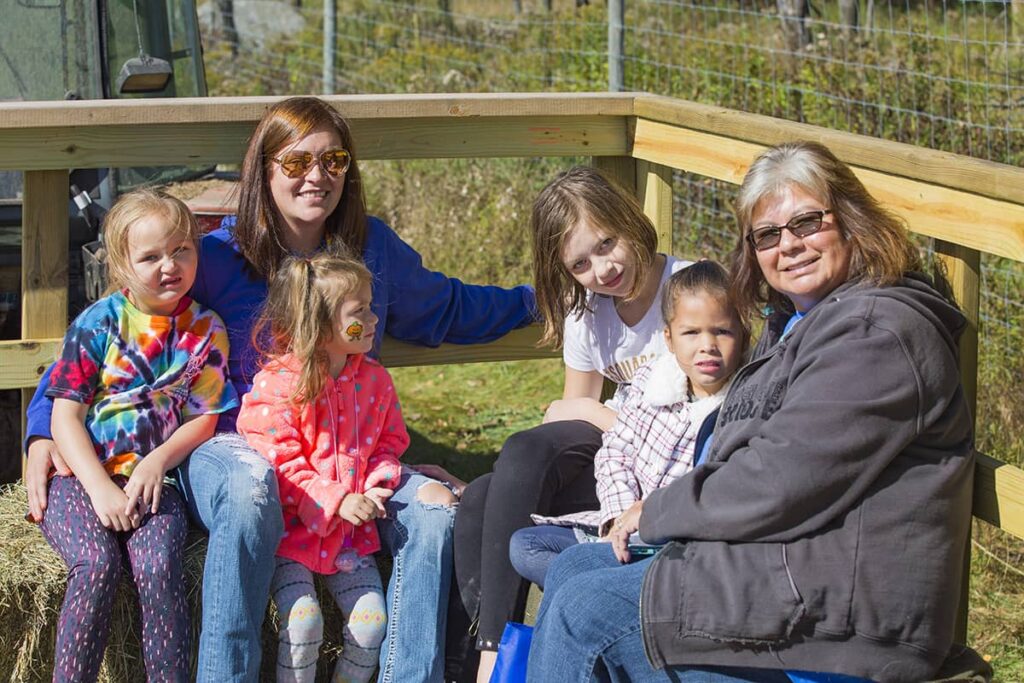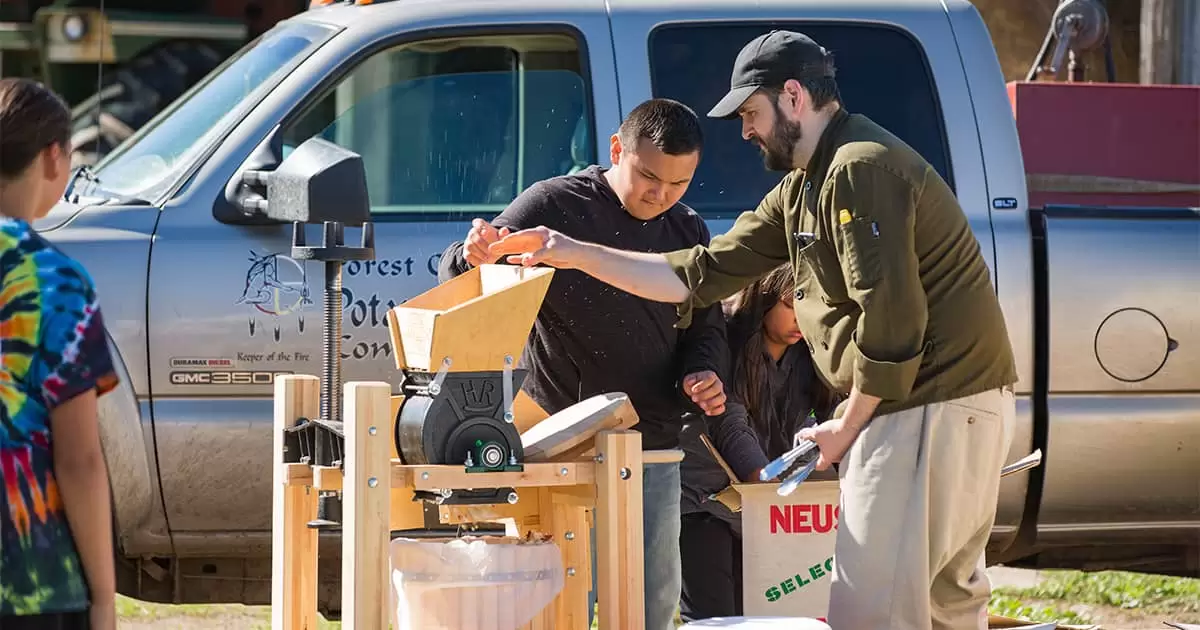 At the moment, the farm is equipped with three high tunnels that maintain the growth of different vegetables including corn, potatoes, rutabagas, cucumbers, zucchini, tomatoes, and bell peppers among others. There are also pigs, cattle, and turkeys for meat production and free-range chickens which are for both egg production and meat intake. In addition, a large apple orchard is being established; hopefully it will soon provide bushels of the fruit for everyone’s consumption. Berry patches have been started and hopefully will expand quickly to provide fresh berries to be used in various preserves.
The high tunnels offer a huge greenhouse type of environment, and crops will be maintained in these up to the month of November. Once they are harvested, things will be cleaned up in preparation for the next growing season. With the help of the farm staff which includes: Dave Cronauer, farm manager; Joe Shepard, assistant farm manager;
and Bill Belland, farm technician; it will then be time for farm workers to research foods, evaluate how things went this year, and make adjustments for the next growing season.
The staff will then use this information to help come up with a proposal for next year’s crops. The farm staff will work with tribal departments to figure out just what foods they need or want. They will also decide what kinds of animals they will need to get and raise. By March, it will be time to start planting in the high tunnels again.
At the moment, the farm is equipped with three high tunnels that maintain the growth of different vegetables including corn, potatoes, rutabagas, cucumbers, zucchini, tomatoes, and bell peppers among others. There are also pigs, cattle, and turkeys for meat production and free-range chickens which are for both egg production and meat intake. In addition, a large apple orchard is being established; hopefully it will soon provide bushels of the fruit for everyone’s consumption. Berry patches have been started and hopefully will expand quickly to provide fresh berries to be used in various preserves.
The high tunnels offer a huge greenhouse type of environment, and crops will be maintained in these up to the month of November. Once they are harvested, things will be cleaned up in preparation for the next growing season. With the help of the farm staff which includes: Dave Cronauer, farm manager; Joe Shepard, assistant farm manager;
and Bill Belland, farm technician; it will then be time for farm workers to research foods, evaluate how things went this year, and make adjustments for the next growing season.
The staff will then use this information to help come up with a proposal for next year’s crops. The farm staff will work with tribal departments to figure out just what foods they need or want. They will also decide what kinds of animals they will need to get and raise. By March, it will be time to start planting in the high tunnels again. Swine, Dine & Dash Event Takes Place at New Farm

.entry-date::after {content: ” by Val Niehaus”;}
October 15, 2017 – Full Issue
What a beautiful fall day it was on Sept. 30, 2017, when the Swine, Dine
& Dash event was held on the grounds of the new Forest County Potawatomi (FCP) farm. The farm has been developed on the property initially used for the Red Deer Ranch on County H in Blackwell. Over the past year, the FCP Natural Resources department has been working hard to redevelop these grounds into what is now called the Bodwéwadmi ktagen (Potawatomi Farm).
The turnout for this event was huge! There were far more attendees than the Natural Resources department and FCP Health & Wellness Center’s Community Health department ever anticipated, and this was great to see! It was a family-oriented event enjoyed by all ages. With the weather being perfect for outdoor activities, participants could enjoy hay rides, face painting, pumpkin patch along with painting your own pumpkin, a corn sandbox, sack races and many other games and activities. You could even get up close and personal with the animals if you cared to; considering the number who took the walk out into the fields to visit the chickens, pigs, and cows, this was clearly a popular part.
The day started with a “fun run” which was open to whomever wanted to participate. Those who didn’t were able to mingle and visit while awaiting the noon meal provided by Dewing’s Catering. A highlight of the feast was a pig roast and all the fixings with meat provided by the farm. Richard Gougé said the prayer before everyone was able to dig in. It truly was a delightful day with a broad variety of things to do for all ages, and it was obviously enjoyed by all. This was a perfect way to introduce the new enterprise to the community.
The mission of the farm is: “To provide a natural, sustainable source of vegetables, fruits, greens, sh and animal proteins to the tribal community.”
Products raised on the farm will be processed for distribution in the community through three different phases:
Phase 1: Provide food for the elderly programs, day care, preschool and community events.
Phase 2: Provide food to all tribal elders.
Phase 3: Provide food to all tribal members.
 At the moment, the farm is equipped with three high tunnels that maintain the growth of different vegetables including corn, potatoes, rutabagas, cucumbers, zucchini, tomatoes, and bell peppers among others. There are also pigs, cattle, and turkeys for meat production and free-range chickens which are for both egg production and meat intake. In addition, a large apple orchard is being established; hopefully it will soon provide bushels of the fruit for everyone’s consumption. Berry patches have been started and hopefully will expand quickly to provide fresh berries to be used in various preserves.
The high tunnels offer a huge greenhouse type of environment, and crops will be maintained in these up to the month of November. Once they are harvested, things will be cleaned up in preparation for the next growing season. With the help of the farm staff which includes: Dave Cronauer, farm manager; Joe Shepard, assistant farm manager;
and Bill Belland, farm technician; it will then be time for farm workers to research foods, evaluate how things went this year, and make adjustments for the next growing season.
The staff will then use this information to help come up with a proposal for next year’s crops. The farm staff will work with tribal departments to figure out just what foods they need or want. They will also decide what kinds of animals they will need to get and raise. By March, it will be time to start planting in the high tunnels again.
At the moment, the farm is equipped with three high tunnels that maintain the growth of different vegetables including corn, potatoes, rutabagas, cucumbers, zucchini, tomatoes, and bell peppers among others. There are also pigs, cattle, and turkeys for meat production and free-range chickens which are for both egg production and meat intake. In addition, a large apple orchard is being established; hopefully it will soon provide bushels of the fruit for everyone’s consumption. Berry patches have been started and hopefully will expand quickly to provide fresh berries to be used in various preserves.
The high tunnels offer a huge greenhouse type of environment, and crops will be maintained in these up to the month of November. Once they are harvested, things will be cleaned up in preparation for the next growing season. With the help of the farm staff which includes: Dave Cronauer, farm manager; Joe Shepard, assistant farm manager;
and Bill Belland, farm technician; it will then be time for farm workers to research foods, evaluate how things went this year, and make adjustments for the next growing season.
The staff will then use this information to help come up with a proposal for next year’s crops. The farm staff will work with tribal departments to figure out just what foods they need or want. They will also decide what kinds of animals they will need to get and raise. By March, it will be time to start planting in the high tunnels again.
 At the moment, the farm is equipped with three high tunnels that maintain the growth of different vegetables including corn, potatoes, rutabagas, cucumbers, zucchini, tomatoes, and bell peppers among others. There are also pigs, cattle, and turkeys for meat production and free-range chickens which are for both egg production and meat intake. In addition, a large apple orchard is being established; hopefully it will soon provide bushels of the fruit for everyone’s consumption. Berry patches have been started and hopefully will expand quickly to provide fresh berries to be used in various preserves.
The high tunnels offer a huge greenhouse type of environment, and crops will be maintained in these up to the month of November. Once they are harvested, things will be cleaned up in preparation for the next growing season. With the help of the farm staff which includes: Dave Cronauer, farm manager; Joe Shepard, assistant farm manager;
and Bill Belland, farm technician; it will then be time for farm workers to research foods, evaluate how things went this year, and make adjustments for the next growing season.
The staff will then use this information to help come up with a proposal for next year’s crops. The farm staff will work with tribal departments to figure out just what foods they need or want. They will also decide what kinds of animals they will need to get and raise. By March, it will be time to start planting in the high tunnels again.
At the moment, the farm is equipped with three high tunnels that maintain the growth of different vegetables including corn, potatoes, rutabagas, cucumbers, zucchini, tomatoes, and bell peppers among others. There are also pigs, cattle, and turkeys for meat production and free-range chickens which are for both egg production and meat intake. In addition, a large apple orchard is being established; hopefully it will soon provide bushels of the fruit for everyone’s consumption. Berry patches have been started and hopefully will expand quickly to provide fresh berries to be used in various preserves.
The high tunnels offer a huge greenhouse type of environment, and crops will be maintained in these up to the month of November. Once they are harvested, things will be cleaned up in preparation for the next growing season. With the help of the farm staff which includes: Dave Cronauer, farm manager; Joe Shepard, assistant farm manager;
and Bill Belland, farm technician; it will then be time for farm workers to research foods, evaluate how things went this year, and make adjustments for the next growing season.
The staff will then use this information to help come up with a proposal for next year’s crops. The farm staff will work with tribal departments to figure out just what foods they need or want. They will also decide what kinds of animals they will need to get and raise. By March, it will be time to start planting in the high tunnels again. 